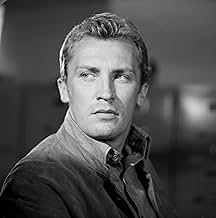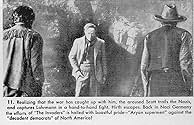Füge eine Handlung in deiner Sprache hinzuA World War II U-boat crew are stranded in northern Canada. To avoid internment, they must make their way to the border and get into the still-neutral U.S.A World War II U-boat crew are stranded in northern Canada. To avoid internment, they must make their way to the border and get into the still-neutral U.S.A World War II U-boat crew are stranded in northern Canada. To avoid internment, they must make their way to the border and get into the still-neutral U.S.
- 1 Oscar gewonnen
- 9 Gewinne & 2 Nominierungen insgesamt
Empfohlene Bewertungen
And since the IMDb, to which I contributed long before it became such a commercial concern, insists that I have at least 10 lines of text, I will keep on jabbering for a few more lines, in order to preserve the above comments for posteriority ...
Wusstest du schon
- WissenswertesOn a trip home to Wales, Niall MacGinnis was stopped and searched by police. He was arrested as a German spy when the police found a photo in his wallet of MacGinnis dressed in a German sailor's uniform, standing next to what appeared to be a U-boat. In fact, it was a publicity photo from MacGinnis' role in this movie. MacGinnis spent several days in jail before documents were sent from London verifying that he had been in the movie.
- PatzerWhen the train is going over the railroad bridge at Niagara Falls ostensibly traveling from Canada to the U.S., it actually is heading from the U.S. into Canada. The water in the Niagara River under the bridge in the scene is coming toward the camera, with the train moving across the bridge from left to right. Canada would be on the right in the shot, the direction the so-called U.S. bound train is traveling.
- Zitate
[first lines]
Prologue: I see a long, straight line athwart a continent. No chain of forts, or deep flowing river, or mountain range, but a line drawn by men upon a map, nearly a century ago, accepted with a handshake, and kept ever since. A boundary which divides two nations, yet marks their friendly meeting ground. The 49th parallel: the only undefended frontier in the world.
- Crazy Credits(Spoken introduction) "I see a long straight line athwart a continent. No chain of forts, or deep flowing river, or mountain range, but a line drawn by men upon a map nearly a century ago, accepted by a handshake and kept ever since. A boundary which divides two nations yet marks their friendly meeting grounds, the 49th parallel, the longest undefended frontier in the world."
- Alternative VersionenThe initial American release had many cuts made to avoid upsetting some special interest groups. the running time was cut from 123 minutes to 104 minutes. Most of the submarine's voyage up to Hudson Bay was removed. They dive after sinking the freighter (and filming her crew) and we next see them in the Bay, preparing to send the raiding party ashore. All the scenes of them entering the Bay, including the reference to "his charts" (the missionary's), were cut. They cut all references to the "flying missionary" who was a German spy, the scenes with the map and all of it. They also cut the other "delicate" passage there, where Hirth tells the captive Canadians that the Eskimos are sub-apes like Negroes, only one step above the Jews, and the ripostes from Johnnie and the Factor. Obviously they didn't want to offend southern segregationists or anti-Semites by showing that Nazis shared their racist views, or leave in any dialogue decrying same.
- SoundtracksAlouette
(uncredited)
Traditional French folksong
Sung to accompaniment of accordion by Laurence Olivier
Top-Auswahl
- How long is The Invaders?Powered by Alexa
Details
- Erscheinungsdatum
- Herkunftsland
- Sprachen
- Auch bekannt als
- The Invaders
- Drehorte
- Banff, Banff National Park, Alberta, Kanada(Indian Day scenes)
- Produktionsfirma
- Weitere beteiligte Unternehmen bei IMDbPro anzeigen
Box Office
- Budget
- 132.000 £ (geschätzt)
- Laufzeit
- 2 Std. 3 Min.(123 min)
- Farbe
- Seitenverhältnis
- 1.37 : 1





























